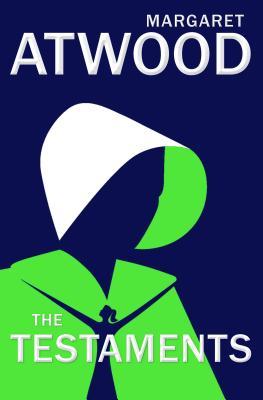
The biggest book of 2019 doesn't have boy wizards in it, fake conspiracies about renaissance artists, secretly evil women, Swedish conspiracy theorists, or teenagers in battles royale. Instead, Margaret Atwood is hailed as the conquering hero, returning readers to Gilead some 34 years after the initial publication of The Handmaid's Tale. The Testaments is not exactly the sequel everyone was clamouring for — the further adventures of Offred — but it's the best possible use of the setting that Atwood could have employed. The Testaments is not warm and cuddly, but it takes a different tone to the nightmarish bitterness that characterised its predecessor: it fair zips along.
The Testaments interweaves the accounts of three women in the fifteen years since the conclusion of The Handmaid's Tale: an Aunt keeps an illicit chronicle of the inception of Gilead; Agnes, a woman born to be married; and Daisy, a Canadian teenager about to realise that her upbringing was sheltered for a reason.
It was always a tall ask to make a sequel to The Handmaid's Tale, with its iconic (and over imitated) ambiguous ending. Atwood's pivot to perspectives totally separate from the society of Handmaids is her wisest move: to see Gilead from different angles is fascinating without feeling like it's retreading old ground. A novel spent partly in a country bordering on a fascistic theocracy is a concept prime for exploration; it's possible that this is merely a slightly exaggerated account of how Canadians feel all the time. From inside the upper, though still second class, echelons, we see how Gilead operates on a bureaucratic level, and how control can be wrested in covert ways. In the case of Agnes, we have a character who has never known anything other than life under Gilead, and how she comes to internalise its lessons and their contradictions.
The Testaments is most refreshing in that it's not about men at all; they get less play than they did in The Handmaid's Tale and, outside of one major character, the book doesn't really concern itself with them. This is a novel about how women relate to one another, under a literal patriarchy and behind the few closed doors that they are allowed. You already know what the men symbolise, and you don't miss them; those on the Canadian side of the border aren't monsters, but they are insignificant next to the power of the three narrators.
Where The Handmaid's Tale was an insulated character study, The Testaments reads far more like a thriller, with propulsive narrative development and a tripartite structure that never kills its momentum. The stories seem separate to begin with, as they cover history and don't always dwell in the furthest point of the novel, but they inevitably dovetail to detail the state of Gilead at a pivotal moment in its history. Atwood tells us more about the workings of Gilead without removing the mystique or undoing any of her work of four decades ago; unbabies still exist, but life outside the wall may not be as hazardous as we had been lead to believe. Never does it feel like Atwood is undoing a legacy, even as she makes things more concrete and shifts us away from the singular view of Offred; The Testaments is a novel that demands not to be savoured but to be devoured.
It is possible that in making an Aunt a narrator, and somewhat justifying her actions, that Atwood has courted controversy. Atwood famously consulted with showrunner Bruce Miller to ensure that nothing that happens in the show would contradict anything that was set to come in The Testaments, and the book itself integrates elements of the show. It's impossible to stuff the cat back into the bag, but it may be better to not have seen the show in advance so as not to get a more slanted prospective of an Aunt who was a far less major character in the original text of The Handmaid's Tale — and ones with a far less evil resumé. The Testaments raises questions about collaboration and white-anting, and whether ends justify means. The thesis presented by Atwood is fairly unambiguous — the aged do not have so much time to equivocate — but questions are raised regardless, and the end note again recontextualises much of what we think we have learned.
The Handmaid's Tale was set in a vague near-future with slightly advanced technology by the standards of 1985. There are a few concessions to the passage of time in the real world: Atwood skewers the ineffectuality of well-meaning modern liberal sloganeering with protestors waving signs saying "GILIBADâ€; two Canadians discuss destroying their phones to avoid being tracked, a complication that would never have arisen in the original; the corruption in Gilead is described as "deplorableâ€. Maybe that last one's a coincidence, but it probably isn't.
What Atwood realises is that Reagan was a mere entrée for the sludge pile that passes for modern politics; The Testaments is perhaps more positive and sunny than The Handmaid's Tale, but Atwood has worked hard for that effect. If a totalitarian regime can rise, so too can it fall, but there will be many casualties along the way.
The Testaments is a sequel that no reader could ever have reasonably expected. Atwood has taken a longstanding ambiguity and cemented something in its place. Even the new ending pretends to have it both ways, with a winking (and winning) final note. The story of Gilead may end with The Testaments—it's unlikely that a 114 year old Atwood will gild the lily any further 35 years hence—but it’s a good place to stop. The Testaments has only one new idea for potential cosplayers, but one suspects that's not why Atwood wrote it. With an overall tone more optimistic than the world in which it was published, The Testaments offers hope to the hopeless; whether it endures remains to be seen, but Atwood has not let herself or her readers down.


